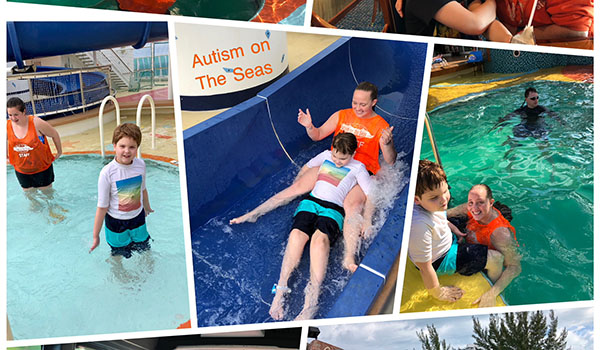
Family Forum / By Laura Townsend Kane: I have a child with autism. He is nine years old, completely nonverbal, and must be supervised at all times.

Author Laura Kane’s son Peter enjoying his time with a volunteer from “Autism on the Seas” on a December 2017 cruise with his family to include his grandparents, aunts, uncles and cousins. The program is in collaboration with major cruise lines and is offered at a very nominal fee above the cost of the actual cruise. It provides respite care and affords families the opportunity to really relax and enjoy their time./ PERSONAL PHOTO BY LAURA KANE
Though I am not in a military family now, I grew up in one (my dad was career Army), so I have a good idea of how families are affected by the military lifestyle. We lived in many different cities and countries, moved every few years, and constantly faced new schools, new homes, new friends, new languages, and new cultures. The idea of raising a disabled child in such a fluctuating environment is daunting. For a child with autism, the element of change is a huge problem. How would a move every 2 years affect them? And what about the times when one spouse is on TDY and the other is essentially a single parent? I don’t have all the answers. What I do have is nine years of experience with “the system” and a few thoughts that may help ease the burden and the fears.
Arm yourself with information. Do as much research as you can to become informed. If your child is not yet diagnosed, check out the CDC’s “Autism Spectrum Disorders: Signs and Symptoms” site (https://www.cdc.gov/ncbddd/autism/signs.html).
Insist on a thorough screening. If your child has an autism diagnosis, learn all you can about the disorder from authoritative online sources such as Autism Speaks or Autism Society. Find out what therapies and treatments are recommended and push for those treatments for your child.
Never stop researching. You may stumble across a therapy or treatment that may work!
Don’t live on an island. I mean this figuratively. Don’t isolate yourself or you will drown in fear and frustration. You are not alone! Know that there are always families in the same situation. Seek them out and force yourself to socialize with those who have children with disabilities. You will be amazed with the valuable tips, tricks, and resources you will discover from each other! You can find these families through schools, churches, and social media organizations. Facebook has a group called “American Military Families Autism Support.” Get involved with groups and organizations that will support you and give you a sense of community.
Know what resources are available to you. We are lucky to live in an age where information is readily available at our fingertips. There are many online resources for autism families. Start with Autism Speaks and take a look at their “Families” page. There are many avenues there for finding resources – even in your local area! Their “100 Day Kit: A Guide for Families After an Autism Diagnosis” is a great source of information. Contact their Autism Response Team if you have trouble finding anything.
Don’t be afraid to fight. If you have a child with a disability, be prepared to fight. Fight for services, for funding, for inclusion, and for the right for your child to be respected and appreciated. It may sound daunting, but if you have followed the first three steps above, you will be ready. You will have your information, your community of supporters, and your knowledge of the resources that should be available to you. Put on your boxing gloves and be fearless for your child!
Ask for help. There will be times when you feel overwhelmed and helpless. This is completely normal, but you must have tools in place to help you through those tough times. For a long time, I hesitated to ask for help. I thought I could do everything myself, then felt like an inadequate parent when things went badly. I learned quickly that you NEED to ASK FOR HELP sometimes.
Form a network with other autism parents and let them know when you need help. Reach out to friends and family and ask for help with errands, housework, transportation, or babysitting. Find a way to get regular RESPITE, because you will need to take breaks from your child. There are local organizations that help with this (in South Carolina we have a Respite Coalition that actually give out grants to families to pay for respite!). There is no shame in asking for help, and you’d be surprised at how many people are eager to help.
Please check out my blog, “Perfectly Peter,” https://perfectlypeter.wordpress.com/. There you will find helpful information that I’ve gathered during our family’s journey through autism. Above all, please remember: you are not alone, and there will always be good days ahead!
Laura Townsend Kane is the assistant director of information studies at the School of Medicine Library, University of South Carolina. She and husband Patrick reside with their three sons in Columbia, SC.
Judy Konitzer is the family forum editor for ARMY AVIATION; questions and suggestions can be directed to her at This email address is being protected from spambots. You need JavaScript enabled to view it..”>This email address is being protected from spambots. You need JavaScript enabled to view it..








